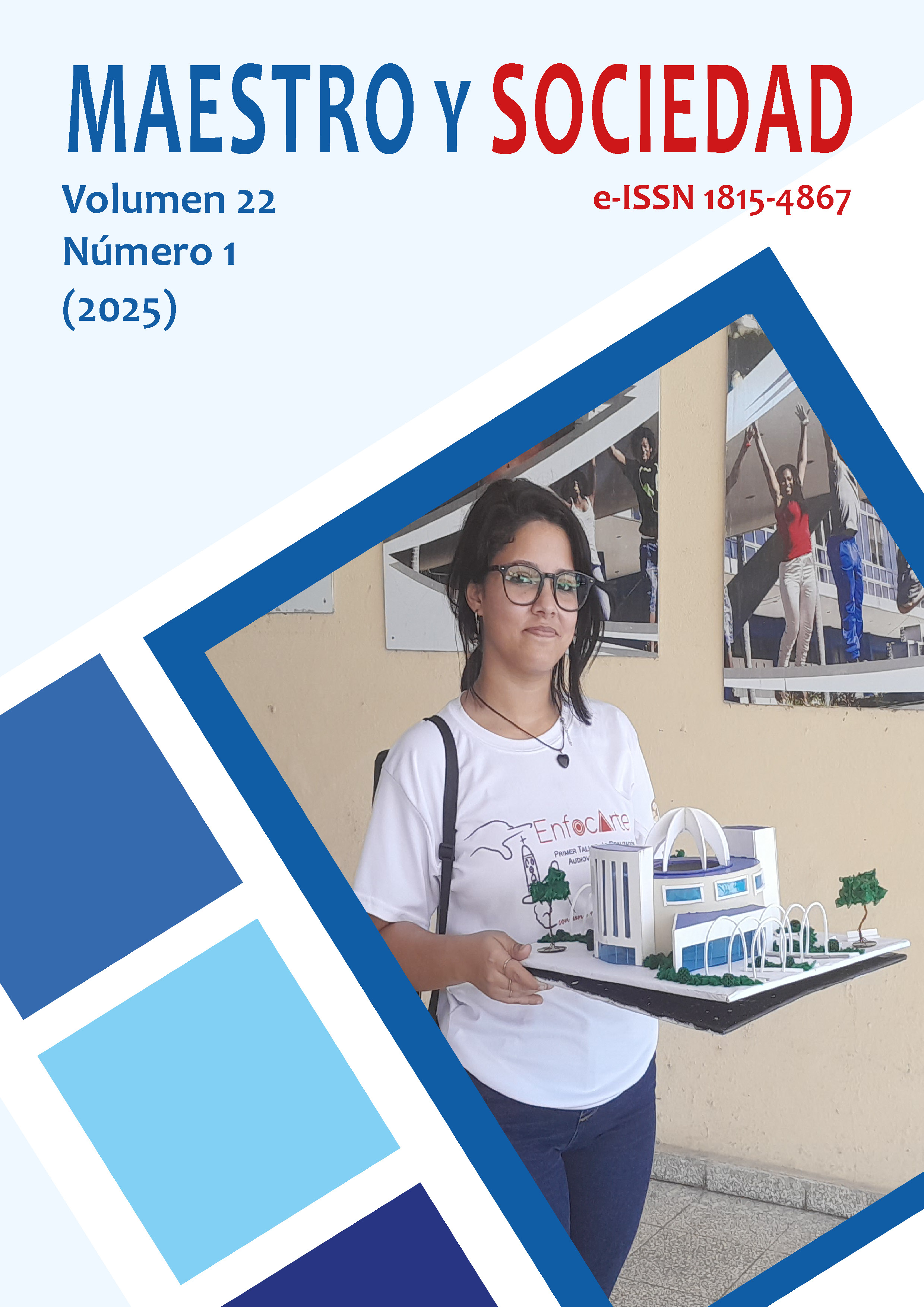Recreational activities for the development of identity and autonomy in children in Early Childhood Education II
Keywords:
autonomy, recreational activities, early childhood education, identity, gamesAbstract
Introduction: In certain contexts where early childhood education is developed, children are characterized by low participation, withdrawal, and dependence on others for educational and personal activities. Objective: To design a didactic proposal based on recreational activities for the development of identity and autonomy in children in Early Childhood Education II. Materials and Methods: The study's approach is mixed (qualitative-quantitative), with theoretical, empirical, and statistical methods guiding the research. The techniques that facilitated data collection were observation of 4- and 5-year-old children, a survey of 3 teachers, and an interview with the director of the "Albert Einstein" Private School located in the Portoviejo canton, Manabí province, Ecuador. Results: The majority of 4- and 5-year-old children have initiated 7 skills. Meanwhile, 100% of the teachers observed problems related to identity and autonomy in 4- and 5-year-old children. And 67% acknowledge that they occasionally promote the development of identity and autonomy in children. Conclusions: The applicability of recreational activities contributes to the development of identity and autonomy in Early Childhood Education II students. Therefore, it is important to apply these strategic actions to motivate 4- and 5-year-old children to perform tasks independently and to believe in their ability to do so. Furthermore, it is important to implement the seven proposed recreational activities, such as creating stories that express emotions; the dress-up game; and dramatized games for safety.
References
Aguayo, Á., Angulo, H., Delgado, S. y Farfán, G. (2020). Análisis del desarrollo integral infantil desde la perspectiva de las actividades en el nivel preescolar. Revista de Ciencias Humanísticas y Sociales, ReHuSo, 5(2), 42-49. https://doi.org/10.5281/zenodo.6808390
Álava, S. y Vega, J. (2025). Sistema de actividades lúdicas para desarrollo de identidad y autonomía en niños de Educación Inicial. Revista Científica Multidisciplinaria, Hexaciencias, 5(9), 115-142. https://soeici.org/index.php/hexaciencias/article/view/477/782
Álvarez, S. (2015). La autonomía personal y la autonomía relacional. Revista Análisis Filosófico, 35(1), 13-26. https://doi.org/10.36446/af.2015.44
Aragundi, D. y Samada, Y. (2022). Enfoque juego-trabajo para favorecer el desarrollo de la autonomía en niños de 4 a 5 años. Revista Cognosis, 303–320. https://revistas.utm.edu.ec/index.php/Cognosis/article/view/5873
Candela, Y. y Benavides, J. (2020). Actividades lúdicas en el proceso de enseñanza-aprendizaje de los estudiantes de la básica superior. Revista de Ciencias Humanísticas y Sociales (ReHuso), 5(3), 78-86. https://revistas.utm.edu.ec/index.php/Rehuso/article/view/1684
Chávez, M., Ramos, A. y Velázquez, P. (2017). Análisis de las estrategias docentes para promover la convivencia y disciplina en el nivel de educación preescolar. Revista Educación, 16(51), 55-78. https://doi.org/10.18800/educacion.201702.003
Lip, C. (2021). Desarrollando autonomía en los niños a través del juego. Revista Científica Ecociencia, 9(1), 30-46. https://doi.org/10.21855/ecociencia.91.583
Ministerio de Educación. (2014). Currículo de Educación Inicial. Ministerio de Educación del Ecuador.
Moreira, K., Marín, L. y Vera, L. (2021). La educación de la autonomía en niños y niñas del subnivel inicial 2 de la escuela Gabriela Mistral. Revista Polo del Conocimiento, 6(8), 135-153. https://polodelconocimiento.com/ojs/index.php/es/article/view/2929
Ochoa, M. (2018). La formación de la autonomía moral desde el preescolar. Revista Científico-Metodológica Varona, (66). https://www.redalyc.org/articulo.oa?id=360671884021
Parra, M. (2020). Actividades Lúdicas como Estrategias de Transición Educativa. Revista Scientifc, 5(17), 143-163. https://doi.org/10.29394/Scientific.issn.2542-2987.2020.5.17.7.143-163
Pedroza, R. (2016). Intereses dominantes de la personalidad en la práctica educativa de estudiantes. Revista Iberoamericana para la Investigación y el Desarrollo Educativo, Ride, 6(12), 1-20. http://www.redalyc.org/articulo.oa?id=498153966006
Piedra, S. (2018). Factores que aportan las actividades lúdicas en los contextos educativos, Revista Cognosis. 3(2), 93-108. https://revistas.utm.edu.ec/index.php/Cognosis/article/view/1211/1403
Posligua, J., Chenche, W. y Vallejo, B. (2017). Incidencia de las actividades lúdicas en el desarrollo del pensamiento creativo en estudiantes de educación general básica. Revista Dominio de las Ciencias, 3(3), 1020-1052. https://dominiodelasciencias.com/ojs/index.php/es/article/view/517
Quijije, A. y Flores, A. (2022). Guía de actividades lúdicas que fomenten la autonomía en los niños de Educación Inicial II. Revista Educare, 26,215–235. https://doi.org/10.46498/reduipb.v26iExtraordinario.1704
Quiroz, B. y Valencia, M. (2024). Las actividades lúdicas en el ámbito de identidad y autonomía en niños de 4 a 5 años. Revista Multidisciplinaria Arbitraria de Investigación, MQRInvestigar, 8(3), 215–239. https://doi.org/10.56048/MQR20225.8.3.2024.215-239
Ramírez, B. (2017). La identidad como constructo de sentido. Revista Andamios, 14(33), 195-216. https://doi.org/10.29092/uacm.v14i33.551
Rincón, S., Mero, Z. y Ruiz, N. (2023). Impacto de las actividades lúdicas en el desarrollo de la autonomía en la infancia temprana. Revista de Educación, Franz Tamayo, 5(14), 9–28. https://doi.org/10.61287/revistafranztamayo.v.5i14.1
Torres, P. (2021). Salud emocional y autonomía en estudiantes infantes. Revista Arbitrada Interdisciplinaria Koinonía, 6(4), 125-135. http://dx.doi.org/10.35381/r.k.v6i4.1449
Tuárez, J. M. y Tarazona, A. (2022). Metodología lúdica en la construcción de la identidad y autonomía de los niños de Educación Inicial. Revista Educare, 26, 459–475. https://doi.org/10.46498/reduipb.v26iExtraordinario.1682
Vasquez, A. y Ríos, J. D. (2025). Impacto del juego libre en el desarrollo de la autonomía infantil. Revista InveCom, 5(4), 1–8. https://doi.org/10.5281/zenodo.14829573
Published
How to Cite
Issue
Section
License
Copyright (c) 2025 Vanessa Lilibeth Arteaga Navarrete

This work is licensed under a Creative Commons Attribution-NonCommercial-NoDerivatives 4.0 International License.
This journal provides immediate open access to its content, based on the principle that offering the public free access to research helps a greater global exchange of knowledge. Each author is responsible for the content of each of their articles.



























 Universidad de Oriente
Universidad de Oriente 